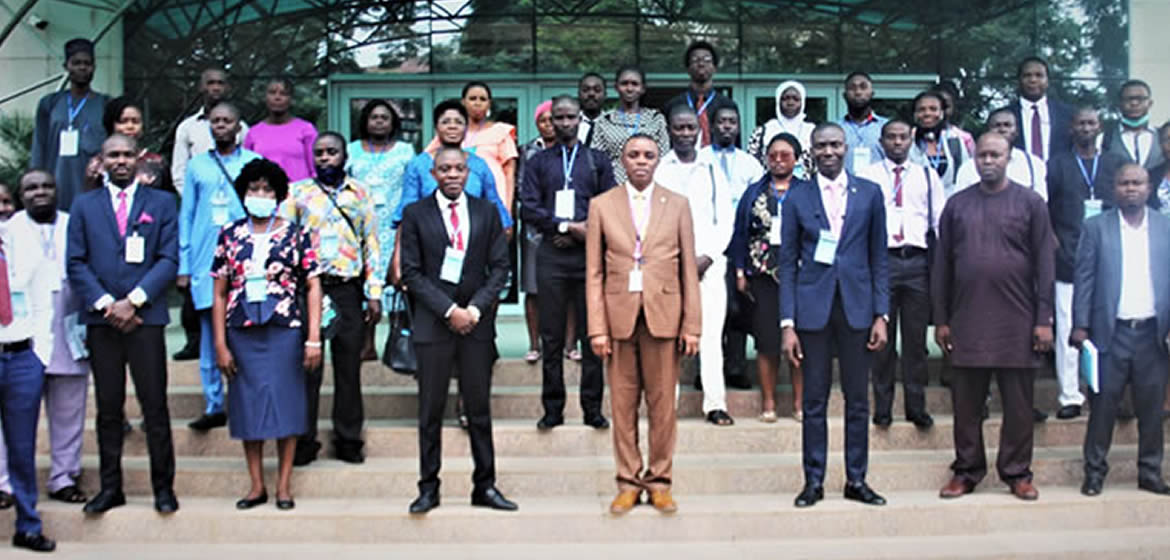The Nigerian Communication Commission (NCC) has urged Nigerians to be actively engaged in the protection of telecommunication infrastructures in their domain and help fight vandalism, which is central to assisting the government in the drive to attain the United Nations Sustainable Development Goals (SDGs).
The Executive Vice-Chairman/CEO, NCC, Professor Umar Garba Danbatta, represented by the Director, Special Duties, Engr. Oluwatoyin Asaju, made the request at the recently held 7th Covenant University Conference on E-business and E-government (CUCEEN 2020), with the theme, 'Innovation and Sustainable Development in the Information Age'. The NCC Vice-Chairman said the Commission would continue to leverage on technology to help the nation's economy bounce back from the brink of uncertainties plaguing the global economic landscape, in the wake of the COVID-19 pandemic.
Professor Danbatta assured participants of the current administration's commitment to the actualization of the 17 Sustainable Development Goals (SDGs), ICT hubs and local content development initiatives amongst others. He said the NCC was conscious of global expectations in the light of the world body's declaration that countries would be able to recover from human and socio-economic devastation caused by the coronavirus by accelerating ICT efforts to achieve a sustainable society.
Similarly, the Director-General/CEO, National Information Technology Development Agency (NITDA), Kashifu Inuwa Abdullahi, said Nigeria was gradually emerging into a future where the digital and physical world would become more integrated. Represented by the Director, IT Infrastructure Solutions, Dr Abdullahi Gambo, the NITDA DG added that boundaries would no longer exist between technologies and humans. According to him, the disruptions that the pandemic has brought upon many organizations had revolutionized the nation's economy, thus compelling many otherwise analogue-based organizations to embrace the new digital economy speedily, to remain afloat.
Ogun State Commissioner for Forestry, Honourable Tunji Akinosi, said the adept combination of the ICT tools in various sectors had been significantly helpful in driving the new global and digital economy in the wake of the coronavirus pandemic. According to him, if Nigeria was to build a sustainable, organized, self-reliant and technology-compliant society, much emphasis had to be made on science, technology and innovation.
Honourable Akinosi was of the view that artificial intelligence and other digital technologies and innovations had the potential to help tackle some of the world's most pressing societal problems, such as climate change, biodiversity, food insecurity, public health risk, and equity.
The Permanent Secretary, Lagos State Ministry of Energy and Mineral Resources, Mr Ahmed Mustapha, said ICT should be seen as a foundational pillar for any 21st Century economy to prosper in this day and age. According to him, ICT's emergence was changing the landscape, and its impact was far-reaching in all sectors of the economy. He noted that the time was ripe for Nigeria to embrace technology as a critical driver of her economy.
Mr Mustapha stated that for a society that was a late starter in the ICT-driven world, there were developmental challenges to overcome. These included inadequate infrastructure, which had power, fibre network, high capital expenditure, low ICT literacy and adoption rate, inadequate ICT Security, and awareness concerns. He added that the benefits significantly outweighed the drawbacks.
The Chairman, CUCEEN 2020 Organizing Committee, Dr Samuel Oni, said the conference had become an annual platform for addressing pertinent issues of governance. The issues included public, corporate, economic and financial, environmental, social, health, educational, etc. in the world of technology, from the academic, policymaker and practitioner's perspectives.
Dr Oni noted that the complexities of societal changes were continually challenging the traditional models for political, economic, and social development. Nations, he explained, were under the immense pressure of technological revolutions, human population growth, globalization, liberalization, climate change, commercialization and privatization, political transformation, and noisome pestilences amongst others.
In his welcome address, the Acting Vice-Chancellor, Professor Akan Williams, said available scientific evidence indicated that humanity was living unsustainably and collective efforts were required to resolve this problem. He noted that there was a firm understanding that digital technology could facilitate the achievement of all the SDGs and it would be necessary to exploit this potential to be able to accomplish the goals by 2030.
However, he noted that there was a need to synchronize transformation towards sustainability as digitalization was not only a vehicle for solving sustainability challenges, it was also a vital driver of disruptions in business and government operations.
Professor Williams promised the gathering that Covenant would remain committed to promoting multidisciplinary research efforts to resolve sustainable development issues confronting Africa and the world. He stated that the University would continue to provide needed support to her research clusters, including the Covenant University Centre for e-Business and e-Governance Research. According to him, the ultimate goal was for Covenant to be in the vanguard of advocacy for maximizing the use of digital technology to provide effective and efficient business and government services to citizens, irrespective of where they reside.
The 3-day conference attracted the academic world, government employees, captains of industry, legislative aides and postgraduate students, both in the physical and digital space of the forum.

